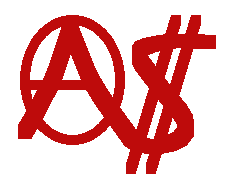1. What is anarcho-capitalism?
Anarcho-capitalism is the political philosophy and theory that- the State is an unnecessary evil and should be abolished, and
- a free-market private property economic system is morally permissible.
A typical dictionary definitionPf of anarchism is: "The theory or doctrine that all forms of government are oppressive and undesirable and should be abolished."Pf This definition follows the etymology of the word: "Anarchism" is derived from the Greek αναρχία meaning "without archon" (ruler, chief, or king.) This is the core meaning of the term - against the State. This means against it in principle, as an institution, not merely against certain policies or personnel.
Murray Rothbard coined the term "anarcho-capitalist" in the winter of 1949 or 1950. "My whole position was inconsistent [...], there were only two logical possibilities: socialism, or anarchism. Since it was out of the question for me to become a socialist, I found myself pushed by the irresistible logic of the case, a private property anarchist, or, as I would later dub it, an anarcho-capitalist."Pf
Some prefer the term "market anarchism" to avoid the negative connotations some people have with "capitalism."
2. Why should one consider anarcho-capitalism?
 First, there is the issue of self-ownership, as the abolitionists called it, or moral autonomy as the philosophers call it. Is your life your own moral purpose? Do you owe anyone obedience regardless of consent? In natural rights language: Do you have rights - moral claims to freedom of action? If you answer yes to any of these questions, then logic leads you to the position of philosophical anarchism.
First, there is the issue of self-ownership, as the abolitionists called it, or moral autonomy as the philosophers call it. Is your life your own moral purpose? Do you owe anyone obedience regardless of consent? In natural rights language: Do you have rights - moral claims to freedom of action? If you answer yes to any of these questions, then logic leads you to the position of philosophical anarchism. The defining mark of the state is authority, the right to rule. The primary obligation of man is autonomy, the refusal to be ruled. It would seem, then, that there can be no resolution of the conflict between the autonomy of the individual and the putative authority of the state. Insofar as a man fulfills his obligation to make himself the author of his decisions, he will resist the state's claim to have authority over him. That is to say, he will deny that he has a duty to obey the laws of this state simply because they are the laws. In that sense, it would seem that anarchism is the only political doctrine consistent with the virtue of autonomy." - Robert Paul Wolff, In Defense of Anarchism.A second more utilitarian reason is the dismal record of States. Considering all the war, genocide, slavery, and repression perpetrated by States through history, might humanity do better without this barbaric institution? As the young Edmund Burke wrote in the world's first anarchist essay (before he went conservative):
These Evils are not accidental. Whoever will take the pains to consider the Nature of Society, will find they result directly from its Constitution. For as Subordination, or in other Words, the Reciprocation of Tyranny, and Slavery, is requisite to support these Societies, the Interest, the Ambition, the Malice, or the Revenge, nay even the Whim and Caprice of one ruling Man among them, is enough to arm all the rest, without any private Views of their own, to the worst and blackest Purposes; and what is at once lamentable and ridiculous, these Wretches engage under those Banners with a Fury greater than if they were animated by Revenge for their own proper Wrongs - Edmund Burke, A Vindication of Natural Society.That was written in 1756, long before modern weapons of mass destruction and long before 170 million civilian people were murdered by their own governments in the 20th century. That's just civilian deaths perpetrated by their own governments; it doesn't count the deaths due to enemy States, deaths of soldiers, dislocated refugees, and so on. To quote Rothbard, "If we look at the black record of mass murder, exploitation, and tyranny levied on society by governments over the ages, we need not be loath to abandon the Leviathan State and ... try freedom."
No comments:
Post a Comment